| About
the project
Charles
Darwin University in Darwin, Australia has conducted a sea turtle research
project to Bare Sand Island for the past eight years. This project is
a scientific study to examine the biology and ecology of nesting and
foraging sea turtles. This will help with sea turtle conservation regionally,
nationally and internationally.
The project is run by Michael Guinea and Scott
Whiting (contact details below).
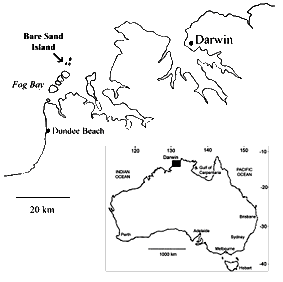
Location
Bare Sand
Island is situated at the end of a chain of islands in northern Fog
Bay, about 50 km west of Darwin. The island is approximately 1.8 km
in circumference. Bare Sand Island sits upon a rocky reef, and as the
name suggests is almost all sand with very little vegetation and almost
no shade.
Environment
Bare
Sand Island is mostly sand and consists of low dunes sparsely vegetated
with grasses and herbs. Two trees grow on the island but only one is
suitable for shade. The island is 1.8 km in circumference and takes
about 40 min to walk around.
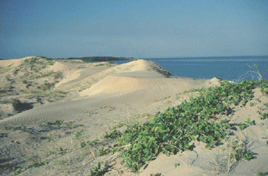 The
region is subject to a large tidal range (up to 8 m) and the island
is therefore subject to strong currents. Strong winds can occur in the
area and this makes camping uncomfortable in the sandy conditions. The
region is subject to a large tidal range (up to 8 m) and the island
is therefore subject to strong currents. Strong winds can occur in the
area and this makes camping uncomfortable in the sandy conditions.
The nearest
settlement is a house on Dum in Mirrie Island (over 10 km away). Otherwise
the research camping is fairly isolated with the next community over
20 km to the south.
Research
activities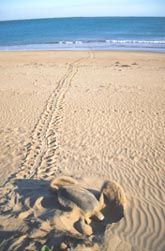
Nesting
Flatback Sea Turtles -
Activities will be conducted at night and early morning and will include
checking the beach for tracks, tagging and measuring adult females,
counting and measuring eggs.
Foraging
Green and Hawksbill Sea Turtles -
Activities will be conducted during the day and will include catching
juvenile turtles on the reef flat using nets and by hand, tagging and
measuring all turtles, helping will specific studies on blood chemistry,
diet analysis and movements (using tracking equipment).
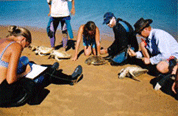 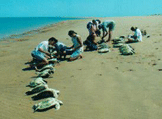 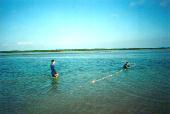
Wildlife
Observations -
Other interesting fauna visit the island and its surrounding waters.
These are opportunistically studied. They include sea and shore birds,
dolphins and dugongs.
Dates
Volunteers
are required for the 2004 research expedition between 13 June and 19
July 2004. There are three separate research trips. There is a cost
for each trip to cover food and transport expenses.
Trip 1: 6 - 13 June 2005 Odyssey Travel
The expedition will be dedicated to paying volunteers booking with Odyssey
Travel. Funds generated from this contribute to funding the research,
ensuring that long-term monitoring is continued. For details of this
trip please contact Odyssey Travel on (02) 4224 7000.
http://www.odysseytravel.com.au/2005Progs/Research/BareSandIsland.html
Trip 2: To be advised. Conservation Volunteers
Australia
This expedition is for Conservation Volunteers Australia (CVA) participants
only. All interested volunteers should contact CVA in Darwin on (08)
8981 3206. This trip will have an extra person supplied by CVA to assist
with general organisation of volunteers and the project during the trip.
http://www.conservationvolunteers.com.au/
Trip 3: To
be advised. Charles
Darwin University
This expedition will be open to anyone. Interested volunteers should
contact Michael Guinea at Charles Darwin University on (08) 8946 6707.
Volunteers for this trip will need to provide their own personal camping
equipment.
All volunteers will be required to fill in
a particulars form once their place on a trip has been confirmed.
What to expect
This is a fun trip but requires hard work and
long hours working under difficult conditions. Volunteers will help
with all research activities during the expeditions. The island consists
of very fine sand that gets everywhere when conditions are windy. It
is difficult to keep it out of cloths, bags, tents etc.
There is
no formal toilet and only saltwater washing. All freshwater is for drinking
and cooking. Food is basic with fresh food only lasting for the first
week. Food for the second week will be dried and tinned. All volunteers
will be required to participate in general camp duties including camp
setup and maintenance and food preparation. The main camp will consist
of a main tent/structure to store food and general gear. During the
day some shade is provided by a small tree.
What to bring
Remember
it will be hot during the day and cold at night, there is limited shade
and fine sand will get everywhere. There are no formal toilets and washing
is only with salt water.
General - Hat, sunglasses, long sleeved shirt
for sun protection, long sleeved shirt and pants to get wet (or wetsuit),
dive boots or old runners to get wet, water proof sunscreen or zinc,
pull-over of jumper, personal toiletries, talcum powder, moisturiser,
swimmers, camera, sleeping bag, torch or head spotlight, fishing gear.
For Trip Three - personal tent, sleeping mat.
Further information
For
further information on the research trip, download the volunteer manual:
 Volunteer Manual
Volunteer Manual
Or have
a look at a review of the research trip in the Australian Geographic:

Australian Geographic
September 2003 issue
Contact details
For
more general information please contact Michael Guinea.
Dr. Michael
Guinea
Faculty of Science
Charles Darwin University
Darwin, NT, Australia, 0909
Tel. +61 8 89466707 Fax +61 8 89466847
Email: [email protected]
|


